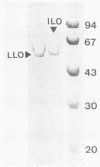Abstract
The strong bizonal hemolysis on blood agar and the positive CAMP reaction with Rhodococcus equi denotes the production of two different cytolytic factors by Listeria ivanovii. One was characterized as a thiol-activated (SH) cytolysin of 61 kilodaltons and was termed ivanolysin O (ILO) since data suggested that it is different from listeriolysin O, the SH-cytolysin produced by Listeria monocytogenes. The other is a 27-kilodalton hemolytic sphingomyelinase C that was found to be the cytolytic factor responsible for the halo of incomplete hemolysis synergistically enhanced by R. equi exosubstances. When thiol-disulfide exchange affinity chromatography and gel filtration were applied to the purification of ILO from concentrated L. ivanovii culture supernatants, the copurification of the two cytolysins was observed. This phenomenon seems to be due to the formation of intermolecular disulfide bonds between ILO and the sphingomyelinase, since the latter was found to contain free SH groups, not essential for the activity. These SH groups could react with the single cysteine residue characteristically present in the SH-cytolysins, forming a dimeric cytolytic complex. The purification of ILO was achieved by a further gel filtration with a reducing agent (dithiothreitol) in the eluent. A method for the purification of the sphingomyelinase based on selective sequestration of ILO from the L. ivanovii concentrated culture supernatant by the SH cytolysin target molecule cholesterol and thiol-disulfide affinity chromatography is described.
Full text
PDF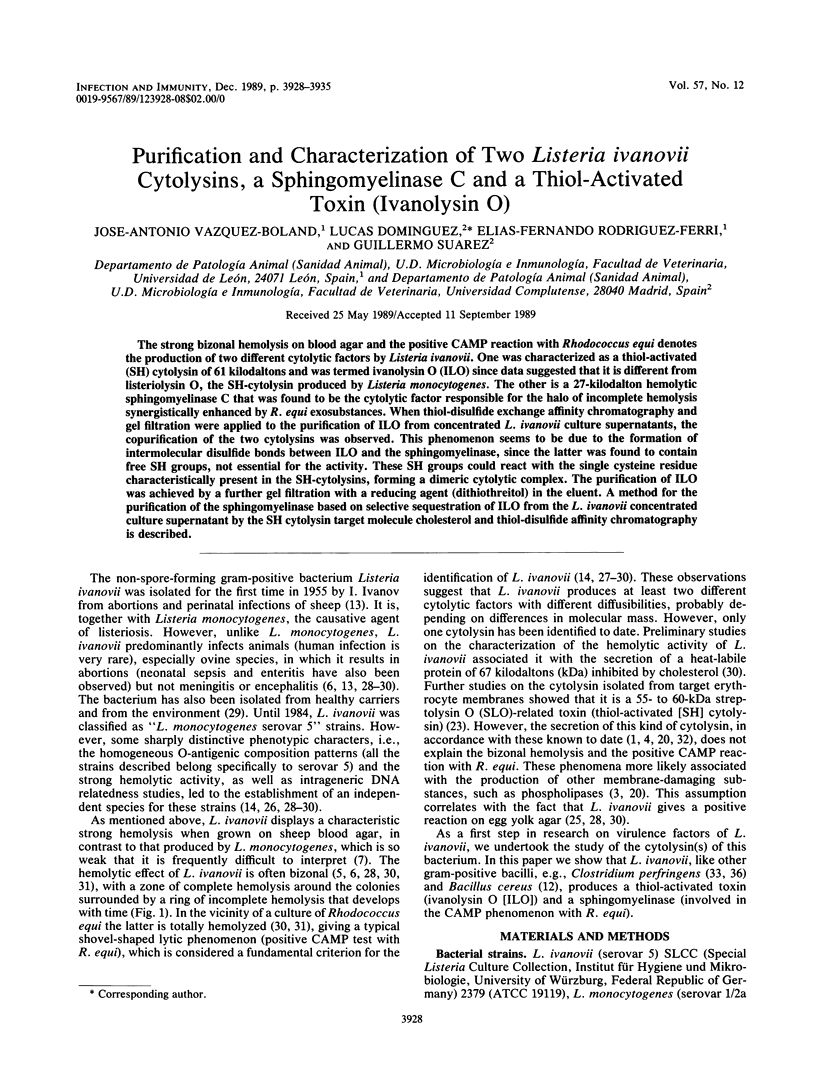
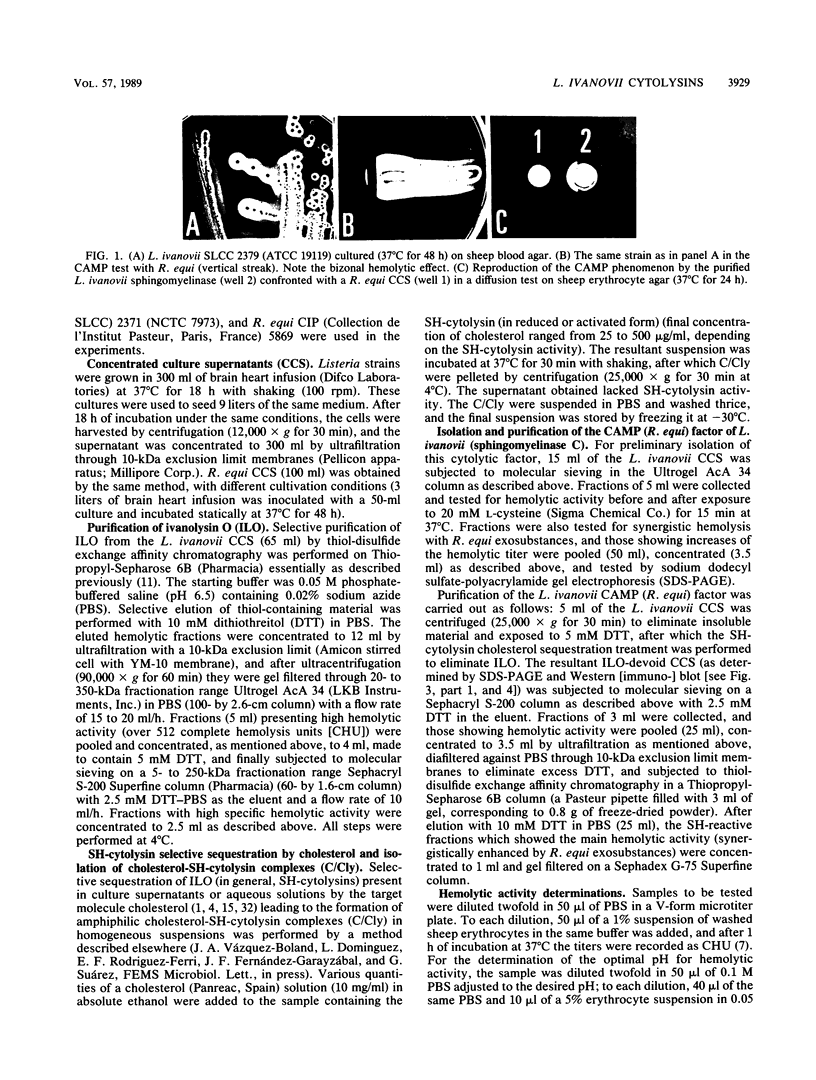
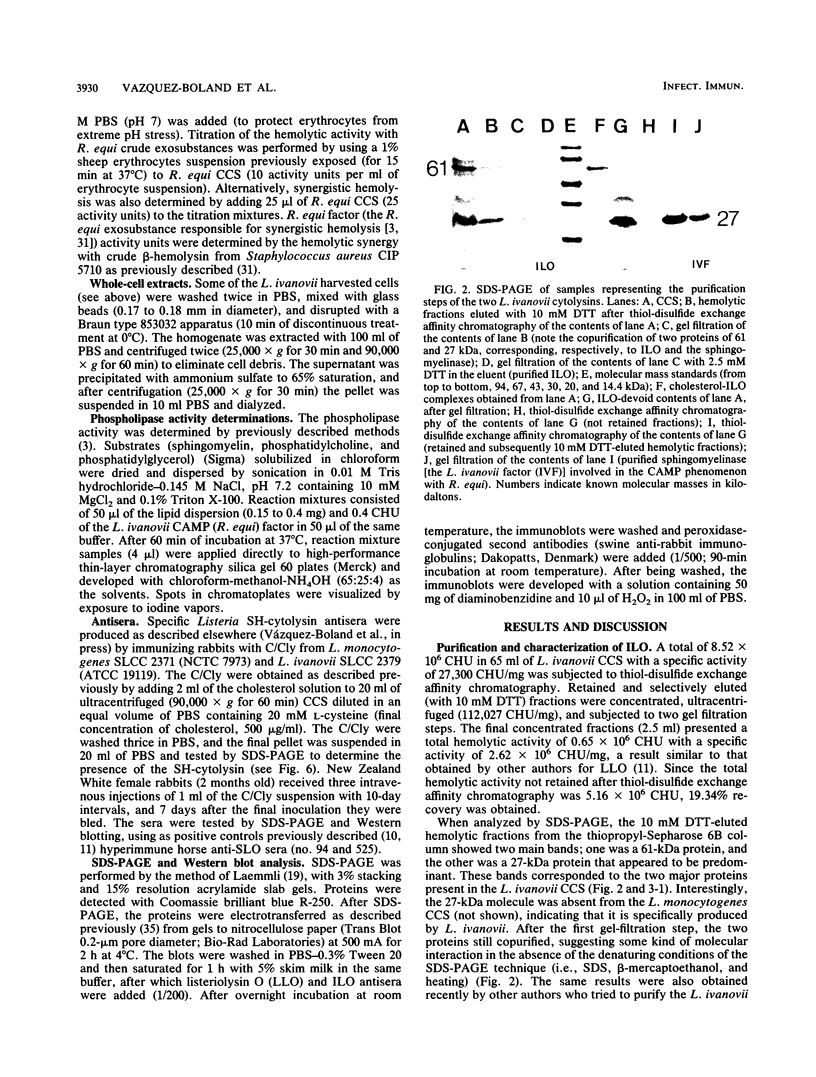
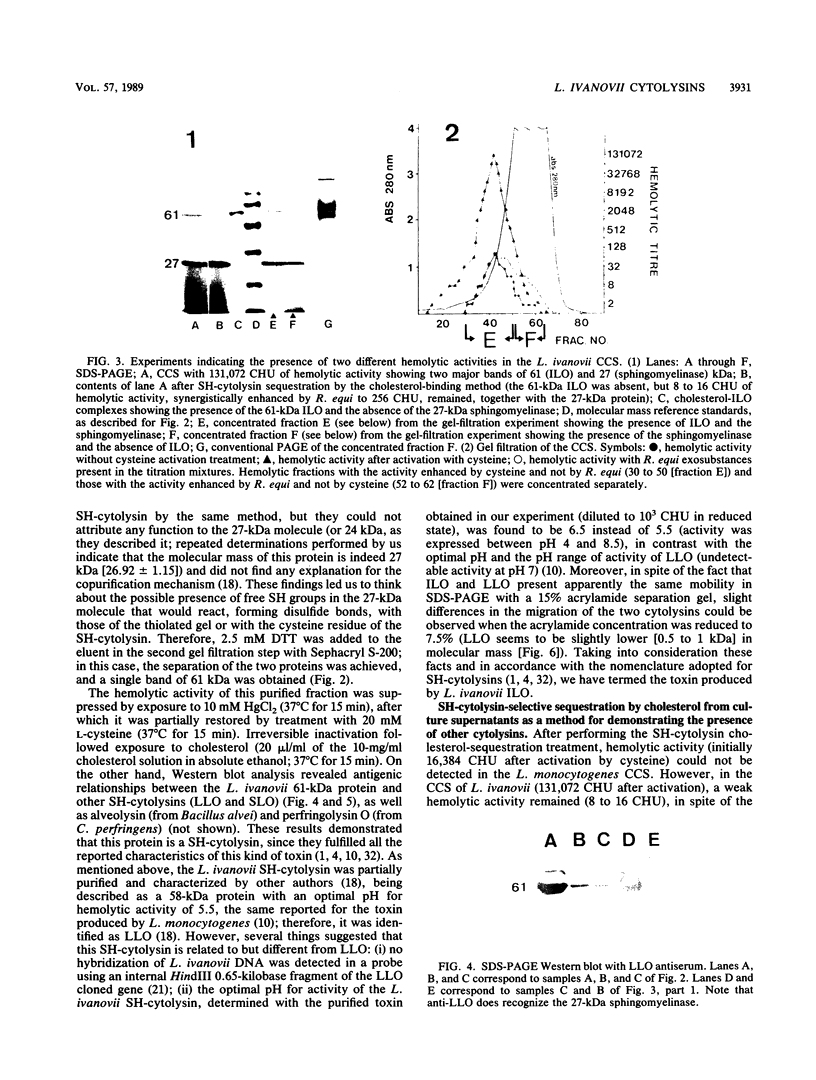
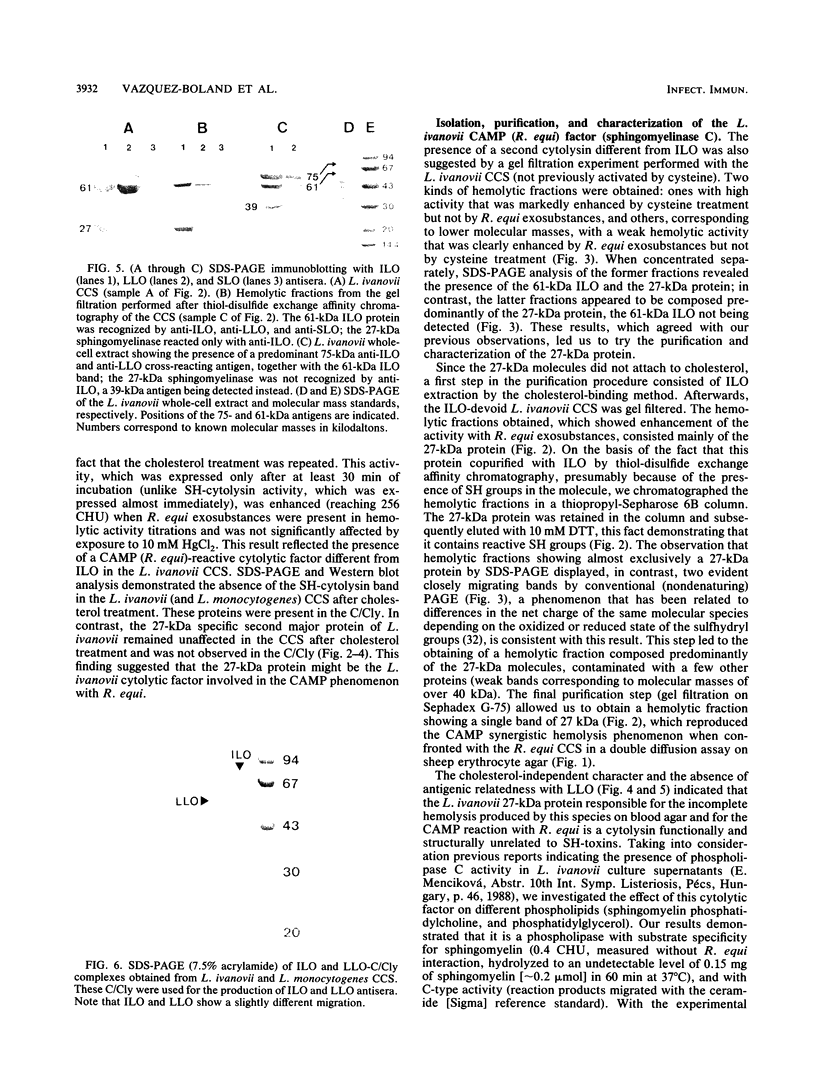
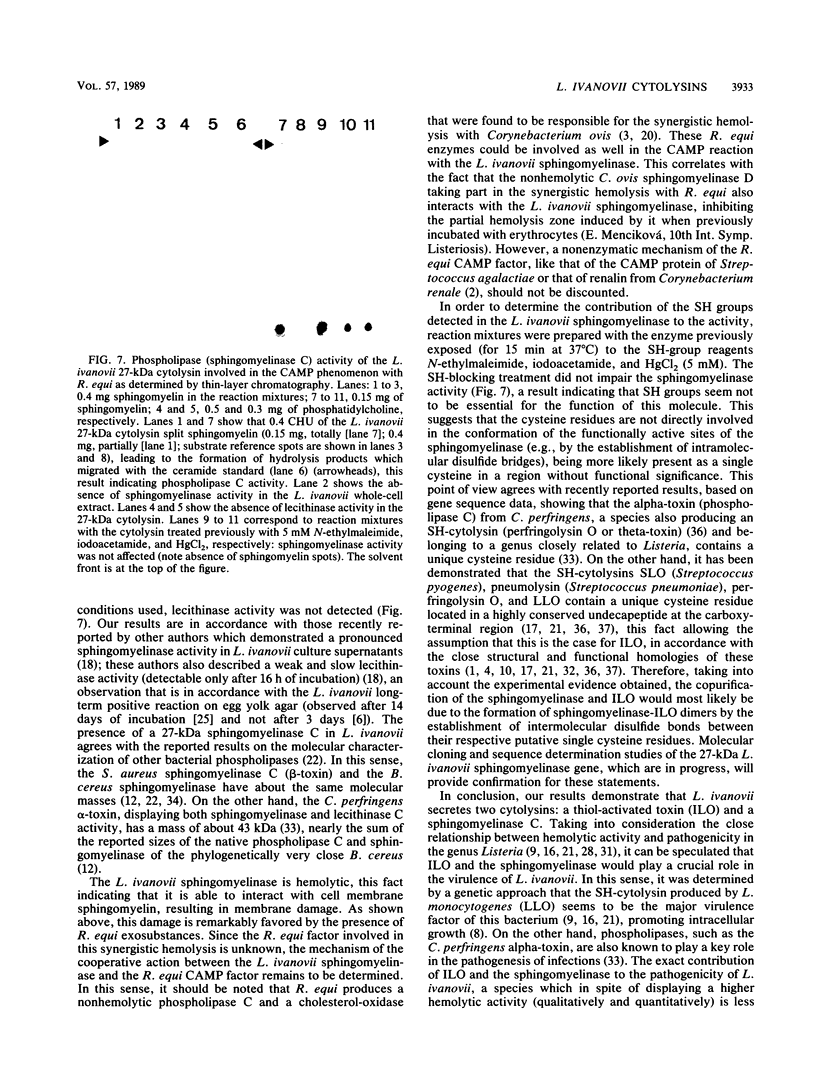
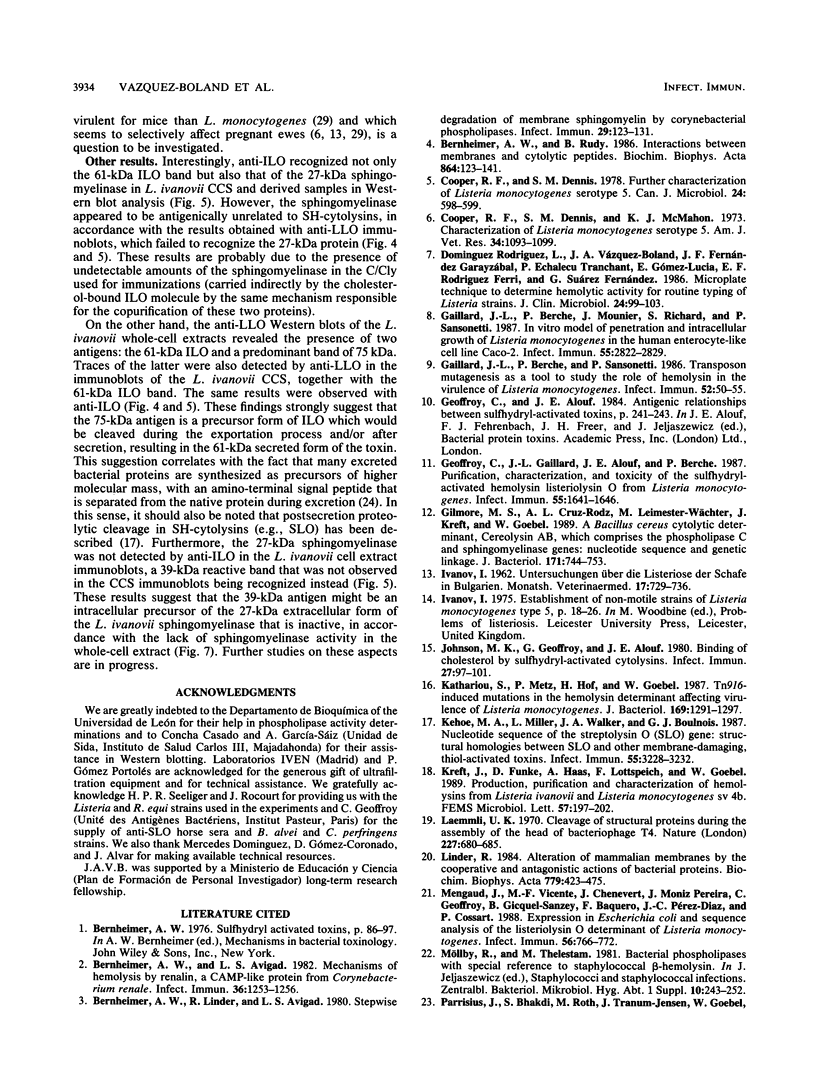
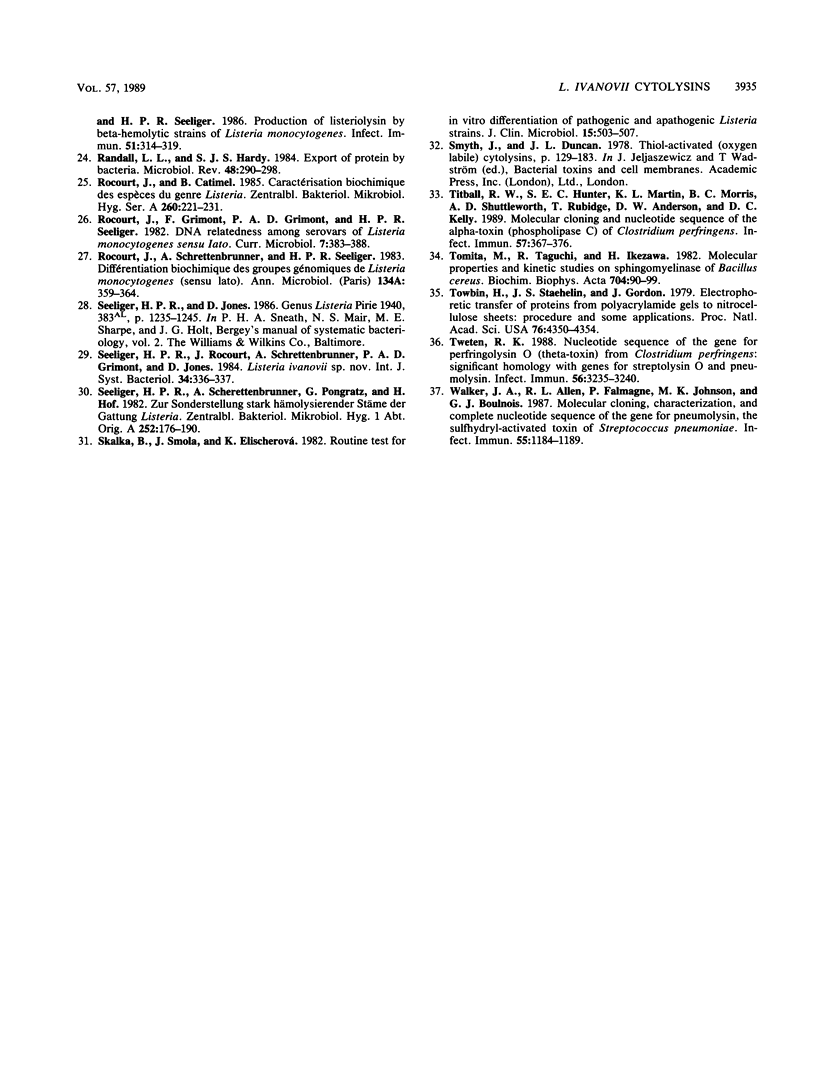
Images in this article
Selected References
These references are in PubMed. This may not be the complete list of references from this article.
- Bernheimer A. W., Avigad L. S. Mechanism of hemolysis by Renalin, a CAMP-like protein from Corynebacterium renale. Infect Immun. 1982 Jun;36(3):1253–1256. doi: 10.1128/iai.36.3.1253-1256.1982. [DOI] [PMC free article] [PubMed] [Google Scholar]
- Bernheimer A. W., Linder R., Avigad L. S. Stepwise degradation of membrane sphingomyelin by corynebacterial phospholipases. Infect Immun. 1980 Jul;29(1):123–131. doi: 10.1128/iai.29.1.123-131.1980. [DOI] [PMC free article] [PubMed] [Google Scholar]
- Bernheimer A. W., Rudy B. Interactions between membranes and cytolytic peptides. Biochim Biophys Acta. 1986 Jun 12;864(1):123–141. doi: 10.1016/0304-4157(86)90018-3. [DOI] [PubMed] [Google Scholar]
- Cooper R. F., Dennis S. M. Further characterization of Listeria monocytogenes serotype 5. Can J Microbiol. 1978 May;24(5):598–599. doi: 10.1139/m78-097. [DOI] [PubMed] [Google Scholar]
- Cooper R. F., Dennis S. M., Harris J. O. Fractionation of Listeria monocytogenes serotype 5. Am J Vet Res. 1973 Aug;34(8):1093–1099. [PubMed] [Google Scholar]
- Dominguez Rodriguez L., Vazquez Boland J. A., Fernandez Garayzabal J. F., Echalecu Tranchant P., Gomez-Lucia E., Rodriguez Ferri E. F., Suarez Fernandez G. Microplate technique to determine hemolytic activity for routine typing of Listeria strains. J Clin Microbiol. 1986 Jul;24(1):99–103. doi: 10.1128/jcm.24.1.99-103.1986. [DOI] [PMC free article] [PubMed] [Google Scholar]
- Gaillard J. L., Berche P., Mounier J., Richard S., Sansonetti P. In vitro model of penetration and intracellular growth of Listeria monocytogenes in the human enterocyte-like cell line Caco-2. Infect Immun. 1987 Nov;55(11):2822–2829. doi: 10.1128/iai.55.11.2822-2829.1987. [DOI] [PMC free article] [PubMed] [Google Scholar]
- Gaillard J. L., Berche P., Sansonetti P. Transposon mutagenesis as a tool to study the role of hemolysin in the virulence of Listeria monocytogenes. Infect Immun. 1986 Apr;52(1):50–55. doi: 10.1128/iai.52.1.50-55.1986. [DOI] [PMC free article] [PubMed] [Google Scholar]
- Geoffroy C., Gaillard J. L., Alouf J. E., Berche P. Purification, characterization, and toxicity of the sulfhydryl-activated hemolysin listeriolysin O from Listeria monocytogenes. Infect Immun. 1987 Jul;55(7):1641–1646. doi: 10.1128/iai.55.7.1641-1646.1987. [DOI] [PMC free article] [PubMed] [Google Scholar]
- Gilmore M. S., Cruz-Rodz A. L., Leimeister-Wächter M., Kreft J., Goebel W. A Bacillus cereus cytolytic determinant, cereolysin AB, which comprises the phospholipase C and sphingomyelinase genes: nucleotide sequence and genetic linkage. J Bacteriol. 1989 Feb;171(2):744–753. doi: 10.1128/jb.171.2.744-753.1989. [DOI] [PMC free article] [PubMed] [Google Scholar]
- Johnson M. K., Geoffroy C., Alouf J. E. Binding of cholesterol by sulfhydryl-activated cytolysins. Infect Immun. 1980 Jan;27(1):97–101. doi: 10.1128/iai.27.1.97-101.1980. [DOI] [PMC free article] [PubMed] [Google Scholar]
- Kathariou S., Metz P., Hof H., Goebel W. Tn916-induced mutations in the hemolysin determinant affecting virulence of Listeria monocytogenes. J Bacteriol. 1987 Mar;169(3):1291–1297. doi: 10.1128/jb.169.3.1291-1297.1987. [DOI] [PMC free article] [PubMed] [Google Scholar]
- Kehoe M. A., Miller L., Walker J. A., Boulnois G. J. Nucleotide sequence of the streptolysin O (SLO) gene: structural homologies between SLO and other membrane-damaging, thiol-activated toxins. Infect Immun. 1987 Dec;55(12):3228–3232. doi: 10.1128/iai.55.12.3228-3232.1987. [DOI] [PMC free article] [PubMed] [Google Scholar]
- Kreft J., Funke D., Haas A., Lottspeich F., Goebel W. Production, purification and characterization of hemolysins from Listeria ivanovii and Listeria monocytogenes Sv4b. FEMS Microbiol Lett. 1989 Jan 15;48(2):197–202. doi: 10.1111/j.1574-6968.1989.tb03298.x. [DOI] [PubMed] [Google Scholar]
- Laemmli U. K. Cleavage of structural proteins during the assembly of the head of bacteriophage T4. Nature. 1970 Aug 15;227(5259):680–685. doi: 10.1038/227680a0. [DOI] [PubMed] [Google Scholar]
- Linder R. Alteration of mammalian membranes by the cooperative and antagonistic actions of bacterial proteins. Biochim Biophys Acta. 1984 Dec 4;779(4):423–435. doi: 10.1016/0304-4157(84)90019-4. [DOI] [PubMed] [Google Scholar]
- Mengaud J., Vicente M. F., Chenevert J., Pereira J. M., Geoffroy C., Gicquel-Sanzey B., Baquero F., Perez-Diaz J. C., Cossart P. Expression in Escherichia coli and sequence analysis of the listeriolysin O determinant of Listeria monocytogenes. Infect Immun. 1988 Apr;56(4):766–772. doi: 10.1128/iai.56.4.766-772.1988. [DOI] [PMC free article] [PubMed] [Google Scholar]
- Parrisius J., Bhakdi S., Roth M., Tranum-Jensen J., Goebel W., Seeliger H. P. Production of listeriolysin by beta-hemolytic strains of Listeria monocytogenes. Infect Immun. 1986 Jan;51(1):314–319. doi: 10.1128/iai.51.1.314-319.1986. [DOI] [PMC free article] [PubMed] [Google Scholar]
- Randall L. L., Hardy S. J. Export of protein in bacteria. Microbiol Rev. 1984 Dec;48(4):290–298. doi: 10.1128/mr.48.4.290-298.1984. [DOI] [PMC free article] [PubMed] [Google Scholar]
- Rocourt J., Alonso J. M., Seeliger H. P. Virulence comparée des cinq groupes génomiques de Listeria monocytogenes (sensu lato). Ann Microbiol (Paris) 1983 May-Jun;134A(3):359–364. [PubMed] [Google Scholar]
- Rocourt J., Catimel B. Caractérisation biochimique des espèces du genre Listeria. Zentralbl Bakteriol Mikrobiol Hyg A. 1985 Oct;260(2):221–231. [PubMed] [Google Scholar]
- Seeliger H. P., Schrettenbrunner A., Pongratz G., Hof H. Zur Sonderstellung stark hämolysierender Stämme der Gattung Listeria. Zentralbl Bakteriol Mikrobiol Hyg A. 1982 Jun;252(2):176–190. [PubMed] [Google Scholar]
- Skalka B., Smola J., Elischerová K. Routine test for in vitro differentiation of pathogenic and apathogenic Listeria monocytogenes strains. J Clin Microbiol. 1982 Mar;15(3):503–507. doi: 10.1128/jcm.15.3.503-507.1982. [DOI] [PMC free article] [PubMed] [Google Scholar]
- Titball R. W., Hunter S. E., Martin K. L., Morris B. C., Shuttleworth A. D., Rubidge T., Anderson D. W., Kelly D. C. Molecular cloning and nucleotide sequence of the alpha-toxin (phospholipase C) of Clostridium perfringens. Infect Immun. 1989 Feb;57(2):367–376. doi: 10.1128/iai.57.2.367-376.1989. [DOI] [PMC free article] [PubMed] [Google Scholar]
- Tomita M., Taguchi R., Ikezawa H. Molecular properties and kinetic studies on sphingomyelinase of Bacillus cereus. Biochim Biophys Acta. 1982 May 21;704(1):90–99. doi: 10.1016/0167-4838(82)90135-2. [DOI] [PubMed] [Google Scholar]
- Towbin H., Staehelin T., Gordon J. Electrophoretic transfer of proteins from polyacrylamide gels to nitrocellulose sheets: procedure and some applications. Proc Natl Acad Sci U S A. 1979 Sep;76(9):4350–4354. doi: 10.1073/pnas.76.9.4350. [DOI] [PMC free article] [PubMed] [Google Scholar]
- Tweten R. K. Nucleotide sequence of the gene for perfringolysin O (theta-toxin) from Clostridium perfringens: significant homology with the genes for streptolysin O and pneumolysin. Infect Immun. 1988 Dec;56(12):3235–3240. doi: 10.1128/iai.56.12.3235-3240.1988. [DOI] [PMC free article] [PubMed] [Google Scholar]
- Walker J. A., Allen R. L., Falmagne P., Johnson M. K., Boulnois G. J. Molecular cloning, characterization, and complete nucleotide sequence of the gene for pneumolysin, the sulfhydryl-activated toxin of Streptococcus pneumoniae. Infect Immun. 1987 May;55(5):1184–1189. doi: 10.1128/iai.55.5.1184-1189.1987. [DOI] [PMC free article] [PubMed] [Google Scholar]








